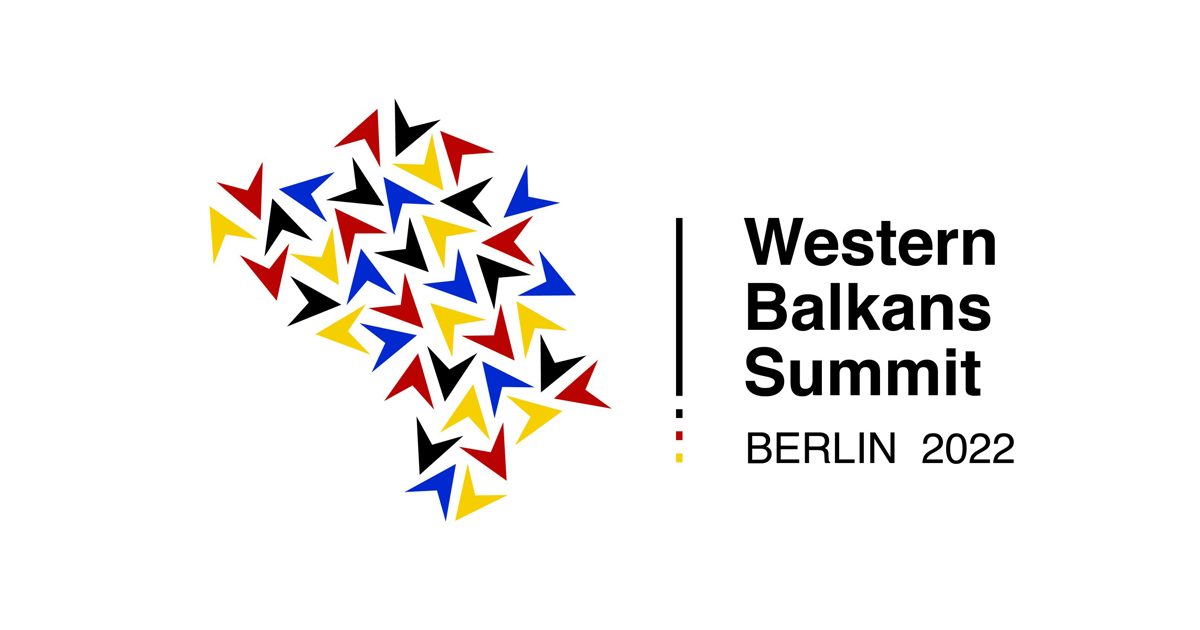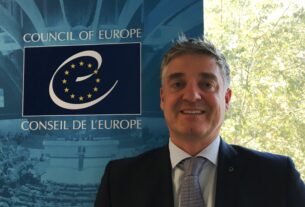BERLIN — The Western Balkans countries took a major step — or better to say, three major steps — on their way to creating a joint regional market and advancing towards the European Union. The foreign ministers of Albania, Bosnia and Herzegovina, Kosovo, Montenegro, North Macedonia and Serbia agreed to sign three mobility agreements at the upcoming Western Balkans Berlin Summit on 3 November, as was announced by German Foreign Minister Annalena Baerbock at the Western Balkans Conference earlier today.
The new momentum for the Berlin Process
Baerbock hosted the Foreign Ministers’ meeting at the Federal Foreign Office in light of the Western Balkans Summit scheduled for November when Prime Ministers of the six countries and EU leaders are going to meet and discuss crucial topics regarding cooperation in the region. The Western Balkans Summit is a part of the Berlin Process, established in 2014 by the former Chancellor Angela Merkel, as a platform for cooperation and development of the region with the purpose of accelerating EU integration of the Western Balkans.
The announcement for the three agreements presents a new momentum for the Berlin Process, following last year’s lack of tangible outcomes. The previous editions of the Berlin Process resulted in several landmark agreements that fostered cooperation in the region, such as the Regional Roaming Agreement signed in 2019 and the establishment of the Regional Youth Cooperation Office in 2016.
“Since the beginning of the Berlin Western Balkans process in 2014, this process has helped to overcome deep, sometimes even bottomless trenches and brought together people of the Western Balkans countries. Reaching concrete, tangible steps for the people on the ground hasn’t always been easy, but it was the motivation for this process and we have made substantial progress,” as Baerbock emphasized when talking about the importance of the Berlin Process. She added that the process isn’t limited to high-level political meetings, but that it also engages civil society and youth, through the Civil Society Forum and the Western Balkan Youth Forum, respectively.
Three big agreements reached under German negotiation leadership
During the previous weeks, the Western Balkans countries participated in the talks led by the Federal Government Special Representative Manuel Sarrazin. They agreed on the three agreements that will be a “big boost to regional mobility.”
The first agreement will enable citizens of the Western Balkans six to travel to the other five countries using only their ID.
“This is something that we in the European Union know, it is something that is part of our everyday lives. We can just travel to our neighbouring country, to work there, to see friends or just to go shopping,” as Baerbock explained.
The other two agreements refer to universities in the Western Balkans mutually recognizing their degrees and the employers recognizing vocational qualifications and degrees from the other Western Balkans countries.
“These are not small technical details. This is a huge step towards living together in the Western Balkans, a huge step towards the joint regional market and also a huge step of the WB towards EU,” the German Foreign Minister emphasized.
She illustrated the significance of these agreements with examples of what they will enable the people of the Western Balkans for the first time after gaining independence.
“For the first time, these three mobility agreements for the WB will help young people from Bosnia and Herzegovina and Kosovo visit each other without first having to apply for a visa. For the first time, for example, a student from Montenegro holding a Bachelor’s degree can easily do a Master’s degree in Tirana. For the first time, an engineer from North Macedonia will be able to work in Serbia without lots of bureaucracy involved,” Baerbock concluded.
Western Balkans EU accession is a priority for the German government
In her opening remarks at today’s Western Balkans Conference, Baerbock said that in times like this, when a war is waged in Europe and European values and security are endangered, a process such as this presents a beacon of hope for peace and stability in the region.
“The peace, stability and economic progress we achieved in the Western Balkans are crucial and it’s vital to bring all countries in the region into the EU. That is a priority for the German government and that is what today’s conference and the Berlin process are all about — to bring the WB into the EU and to ensure peace, stability and economic progress for the future generations,” Baerbock proclaimed.
She highlighted energy security, green transition and cybersecurity as key points for further cooperation in the region. The recent cyber attacks in Albania and Montenegro showed that “cyber threats have no borders and we aren’t safe if our neighbours aren’t safe.” This is why the Minister proposed a partnership aimed at strengthening regional cyber capacities to be developed under the umbrella of the Berlin process.
Baerbock used this opportunity to comment on the recently published EC enlargement package for 2022. She praised the advances made this year and called upon the Member States to deliver their promises to their Western Balkans partners, for example, by giving a green light for Kosovo visa liberalization. However, she warned that all countries need to step up their efforts in fighting corruption and strengthening the rule of law, as this is in the interest of their citizens.
According to Baerbock, there are three crucial points for further improvement of relations in the Western Balkans.
Firstly, she acknowledged the significance of recent elections in Bosnia and Herzegovina and called upon the authorities to fulfil the reforms. “Now it’s important for the Republic of Srpska to end political blockades and separatist policy,” Baerbock added.
Her second point was related to Kosovo-Serbia relations. “The unresolved situation between Kosovo and Serbia is a constant cause of tensions — over car plates, electricity distribution… We cannot afford this any longer. It’s holding both countries and the whole region back. We all know that a comprehensive agreement bringing full normalisation must one day be reached,” Baerbock said. She added that the German government supports the efforts of Miroslav Lajčak, the EU Special Representative for the Belgrade-Priština Dialogue and she encouraged both sides to improve their efforts in this process.
Lastly, she called upon Serbia’s new government to align with EU Common Foreign and Security Policy, particularly in sanctions against Russia and Serbian visa policy.
The post Baerbock announced three mobility agreements to be signed at the Western Balkans Summit appeared first on European Western Balkans.





